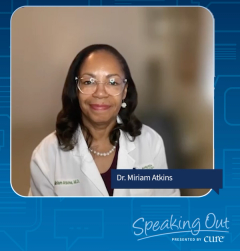
Jumping Through Insurance Hoops for Treatment
As a part of its “Speaking Out” video series, CURE® spoke with Dr. Miriam Atkins, on behalf of the Community Oncology Alliance, about the challenges patients and physicians face with insurance matters during cancer care.
Transcription:
Colleen Moretti: What insurance issues do you face when treating a patient?
Dr. Miriam Atkins: Well, I will start with you don't have enough time for me to answer that question, but I will track it down. There are many hoops that we have to jump through with insurance and I’m glad we’re having this this conversation because oftentimes patients are frustrated because they can't get their care when they want to get it or those sorts of things. They think it's just us, but a lot of time it's insurance. We deal with things like prior authorizations; I apply for a scan, I want to schedule a CT scan or an MRI or PET scan, and then I have to get a prior authorization and it sounds easy but sometimes I'll say if I want to scan this done tomorrow, they may say you need a prior authorization. So, they'll call me at two o'clock today and say you need to call us by four o'clock today or we'll close this case, and we deal with that a lot, so that's the diagnostic part.
As far as the treatment, they have things I call them obstacles. They will tell us “You have to use this drug for nausea before you use the drug you want to use.” Or they tell us where we can have the prescription filled. I had a patient who I wrote a prescription for medication for myeloma on October the 14th — and I know the date because that I'm very frustrated still — I saw him on the 31st and I said how are you doing with the medicine? He said I don't have it. So I went through the charter and realized that his insurance company had redirected a prescription from where I sent the prescription to their pharmacy benefit manager and that person had not sent the medication. Long story short, the patient got his medication on December the 28th. So that is unacceptable. And those are the obstacles and hoops that insurance companies put in front of us almost every day.
Moretti: How does that impact their care moving forward?
Atkins: It delays everything which could mean number one, disease progression. Some cancers need to be treated right away and it's not as simple as putting the patient in the hospital. For instance, if it's an emergency, I can put the patient in the hospital for intravenous therapy, and that cost the patient more money and also costs Medicare more money. If it's an oral chemotherapy, those drugs are not on the formulary for the hospital so putting them in the hospital to start treatment is not an option.
The other thing is the psychological effect. To a patient, every day is an eternity. So even though it may not make a big deal in the body maybe to wait two weeks, three weeks, but for the patient that takes a definite toll on their mental capacity and dealing with this diagnosis that's already very challenging.
Moretti: How can patients advocate for themselves on Capitol Hill to address this?
Atkins: They could call their leaders. Because I've been to Capitol Hill many times with Community Oncology Alliance over the past several years and the congress people and their aides don't know everything, and they can't know everything. They don't deal with this system. They have their own health care their own their own system, which is not like the one that the rest of us have. So, I think if patients call them and keep calling them and keep calling them because these people want to get reelected, and these patients are their voters.
Moretti: Are there any resources that the Community Oncology Alliance can offer patients when it comes to dealing with insurance matters or drug coverage during their cancer care?
Atkins: The local CPAN (COA Patient Advocacy Network) chapters have educational seminars about who you can call, how you can call your doctor, those sorts of things. And one thing I tell my own patients is that insurance companies pay for drugs based on tier — so a tier one drug is going to be less expensive for the patients out of pocket than a tier two or tier three; most chemotherapy agents are tier three, so the out of pocket can be very expensive. I tell my patients, if the drug out of pocket cost is something astronomical, a unit they cannot afford, find out what the cash price is.
And I'll give an example, I have a patient who I wanted to put on a medication for her gastrointestinal stromal cell tumor, and her out of pocket was going to be $2,500 per month. Well, our office sold it to her cash for $125 per month so that's a big difference for patients. And patients are realizing they can ask the cash price and if you don't run it through the insurance sometimes the cash price is much more economical for the patient. Not all the time because oncology drugs are very expensive, but you just never know I mean that 2500 versus 125 is a big difference for this patient. And the good thing is my pharmacist at my practice told me about it because I didn't even know the difference was that much.
This transcription has been edited for clarity.






